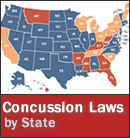Tennessee has become the 45th state to have a youth-concussion law, and Montana may not be far behind.
The Tennessee youth-concussion law, signed by Gov. Bill Haslam on April 12, contains all three provisions of the National Football League’s model legislation, Washington state’s Lystedt Law. Those provisions are: Parents must sign a concussion-information form before their child can participate in sports; any student-athlete suspected of a concussion must be immediately removed from play; and student-athletes removed from play for a concussion must obtain medical clearance before returning.
Tennessee’s law also requires coaches and school athletic directors to undergo an annual concussion-training course, which only about half of states with youth-concussion laws mandate. Each coach and athletic director must sign a concussion-information sheet before beginning practices or competition for the year, under the new law.
The law doesn’t only affect school-based sports. Any entity that organizes a “community-based youth athletic activity for which an activity fee is charged” also must follow the provisions of this new law, including the annual concussion training for coaches and the director of the youth-athletic activity. Few states’ youth-concussion laws extend past schools to community-based youth sports at the moment.
The Tennessee law is scheduled to take effect in January.

Montana could soon join Tennessee in passing a youth-concussion law, as the state Senate passed an amended version of such legislation by a 37-11 vote on April 11. The Montana bill includes all three provisions of the Lystedt Law (like Tennessee’s), and extends the mandatory annual concussion training to coaches, athletic trainers, and officials. Unlike Tennessee’s law, Montana’s legislation does not extend past school sports into community-based youth sports.
After being passed by the Senate, the Montana bill will now be sent to Gov. Steve Bullock for a signature. The bill’s sponsor, Sen. Andrew Blewett, told the